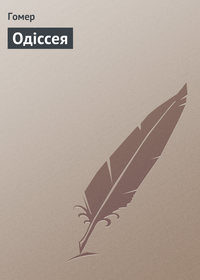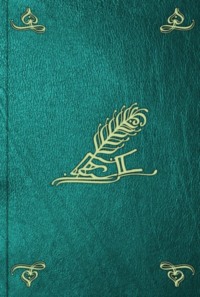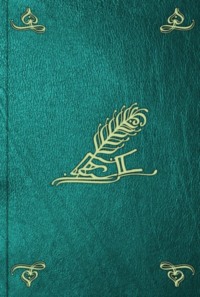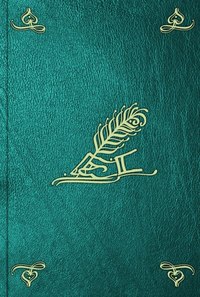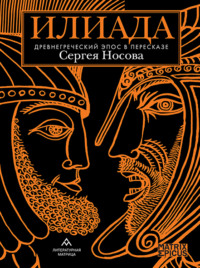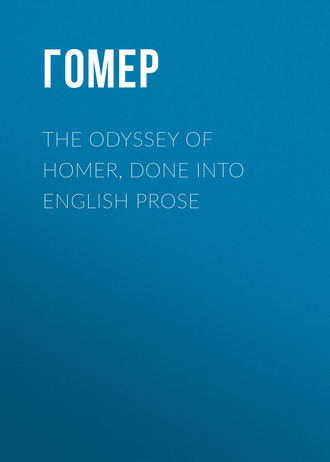 полная версия
полная версияThe Odyssey of Homer, Done into English Prose
'"Hither, come hither, renowned Odysseus, great glory of the Achaeans, here stay thy barque, that thou mayest listen to the voice of us twain. For none hath ever driven by this way in his black ship, till he hath heard from our lips the voice sweet as the honeycomb, and hath had joy thereof and gone on his way the wiser. For lo, we know all things, all the travail that in wide Troy-land the Argives and Trojans bare by the gods' designs, yea, and we know all that shall hereafter be upon the fruitful earth."
'So spake they uttering a sweet voice, and my heart was fain to listen, and I bade my company unbind me, nodding at them with a frown, but they bent to their oars and rowed on. Then straight uprose Perimedes and Eurylochus and bound me with more cords and straitened me yet the more. Now when we had driven past them, nor heard we any longer the sound of the Sirens or their song, forthwith my dear company took away the wax wherewith I had anointed their ears and loosed me from my bonds.
'But so soon as we left that isle, thereafter presently I saw smoke and a great wave, and heard the sea roaring. Then for very fear the oars flew from their hands, and down the stream they all splashed, and the ship was holden there, for my company no longer plied with their hands the tapering oars. But I paced the ship and cheered on my men, as I stood by each one and spake smooth words:
'"Friends, forasmuch as in sorrow we are not all unlearned, truly this is no greater woe that is upon us,22 than when the Cyclops penned us by main might in his hollow cave; yet even thence we made escape by my manfulness, even by my counsel and my wit, and some day I think that this adventure too we shall remember. Come now, therefore, let us all give ear to do according to my word. Do ye smite the deep surf of the sea with your oars, as ye sit on the benches, if peradventure Zeus may grant us to escape from and shun this death. And as for thee, helmsman, thus I charge thee, and ponder it in thine heart seeing that thou wieldest the helm of the hollow ship. Keep the ship well away from this smoke and from the wave and hug the rocks, lest the ship, ere thou art aware, start from her course to the other side, and so thou hurl us into ruin."
'So I spake, and quickly they hearkened to my words. But of Scylla I told them nothing more, a bane none might deal with, lest haply my company should cease from rowing for fear, and hide them in the hold. In that same hour I suffered myself to forget the hard behest of Circe, in that she bade me in nowise be armed; but I did on my glorious harness and caught up two long lances in my hands, and went on the decking of the prow, for thence methought that Scylla of the rock would first be seen, who was to bring woe on my company. Yet could I not spy her anywhere, and my eyes waxed weary for gazing all about toward the darkness of the rock.
"Next we began to sail up the narrow strait lamenting. For on the one hand lay Scylla, and on the other mighty Charybdis in terrible wise sucked down the salt sea water. As often as she belched it forth, like a cauldron on a great fire she would seethe up through all her troubled deeps, and overhead the spray fell on the tops of either cliff. But oft as she gulped down the salt sea water, within she was all plain to see through her troubled deeps, and the rock around roared horribly and beneath the earth was manifest swart with sand, and pale fear gat hold on my men. Toward her, then, we looked fearing destruction; but Scylla meanwhile caught from out my hollow ship six of my company, the hardiest of their hands and the chief in might. And looking into the swift ship to find my men, even then I marked their feet and hands as they were lifted on high, and they cried aloud in their agony, and called me by my name for that last time of all. Even as when as fisher on some headland lets down with a long rod his baits for a snare to the little fishes below, casting into the deep the horn of an ox of the homestead, and as he catches each flings it writhing ashore, so writhing were they borne upward to the cliff. And there she devoured them shrieking in her gates, they stretching forth their hands to me in the dread death-struggle. And the most pitiful thing was this that mine eyes have seen of all my travail in searching out the paths of the sea.
'Now when we had escaped the Rocks and dread Charybdis and Scylla, thereafter we soon came to the fair island of the god; where were the goodly kine, broad of brow, and the many brave flocks of Helios Hyperion. Then while as yet I was in my black ship upon the deep, I heard the lowing of the cattle being stalled and the bleating of the sheep, and on my mind there fell the saying of the blind seer, Theban Teiresias, and of Circe of Aia, who charged me very straitly to shun the isle of Helios, the gladdener of the world. Then I spake out among my company in sorrow of heart:
'"Hear my words, my men, albeit in evil plight, that I may declare unto you the oracles of Teiresias and of Circe of Aia, who very straitly charged me to shun the isle of Helios, the gladdener of the world. For there she said the most dreadful mischief would befal us. Nay, drive ye then the black ship beyond and past that isle."
'So spake I, and their heart was broken within them. And Eurylochus straightway answered me sadly, saying:
'"Hardy art thou, Odysseus, of might beyond measure, and thy limbs are never weary; verily thou art fashioned all of iron, that sufferest not thy fellows, foredone with toil and drowsiness, to set foot on shore, where we might presently prepare us a good supper in this sea-girt island. But even as we are thou biddest us fare blindly through the sudden night, and from the isle go wandering on the misty deep. And strong winds, the bane of ships, are born of the night. How could a man escape from utter doom, if there chanced to come a sudden blast of the South Wind, or of the boisterous West, which mainly wreck ships, beyond the will of the gods, the lords of all? Howbeit for this present let us yield to the black night, and we will make ready our supper abiding by the swift ship, and in the morning we will climb on board, and put out into the broad deep."
'So spake Eurylochus, and the rest of my company consented thereto. Then at the last I knew that some god was indeed imagining evil, and I uttered my voice and spake unto him winged words:
'"Eurylochus, verily ye put force upon me, being but one among you all. But come, swear me now a mighty oath, one and all, to the intent that if we light on a herd of kine or a great flock of sheep, none in the evil folly of his heart may slay any sheep or ox; but in quiet eat ye the meat which the deathless Circe gave."
'So I spake, and straightway they swore to refrain as I commanded them. Now after they had sworn and done that oath, we stayed our well-builded ship in the hollow harbour near to a well of sweet water, and my company went forth from out the ship and deftly got ready supper. But when they had put from them the desire of meat and drink, thereafter they fell a weeping as they thought upon their dear companions whom Scylla had snatched from out the hollow ship and so devoured. And deep sleep came upon them amid their weeping. And when it was the third watch of the night, and the stars had crossed the zenith, Zeus the cloud-gatherer roused against them an angry wind with wondrous tempest, and shrouded in clouds land and sea alike, and from heaven sped down the night. Now when early Dawn shone forth, the rosy-fingered, we beached the ship, and dragged it up within a hollow cave, where were the fair dancing grounds of the nymphs and the places of their session. Thereupon I ordered a gathering of my men and spake in their midst, saying:
'"Friends, forasmuch as there is yet meat and drink in the swift ship, let us keep our hands off those kine, lest some evil thing befal us. For these are the kine and the brave flocks of a dread god, even of Helios, who overseeth all and overheareth all things."
'So I spake, and their lordly spirit hearkened thereto. Then for a whole month the South Wind blew without ceasing, and no other wind arose, save only the East and the South.
'Now so long as my company still had corn and red wine, they refrained them from the kine, for they were fain of life. But when the corn was now all spent from out the ship, and they went wandering with barbed hooks in quest of game, as needs they must, fishes and fowls, whatsoever might come to their hand, for hunger gnawed at their belly, then at last I departed up the isle, that I might pray to the gods, if perchance some one of them might show me a way of returning. And now when I had avoided my company on my way through the island, I laved my hands where was a shelter from the wind, and prayed to all the gods that hold Olympus. But they shed sweet sleep upon my eyelids. And Eurylochus the while set forth an evil counsel to my company:
'"Hear my words, my friends, though ye be in evil case. Truly every shape of death is hateful to wretched mortals, but to die of hunger and so meet doom is most pitiful of all. Nay come, we will drive off the best of the kine of Helios and will do sacrifice to the deathless gods who keep wide heaven. And if we may yet reach Ithaca, our own country, forthwith will we rear a rich shrine to Helios Hyperion, and therein would we set many a choice offering. But if he be somewhat wroth for his cattle with straight horns, and is fain to wreck our ship, and the other gods follow his desire, rather with one gulp at the wave would I cast my life away, than be slowly straitened to death in a desert isle."
'So spake Eurylochus, and the rest of the company consented thereto. Forthwith they drave off the best of the kine of Helios that were nigh at hand, for the fair kine of shambling gait and broad of brow were feeding no great way from the dark-prowed ship. Then they stood around the cattle and prayed to the gods, plucking the fresh leaves from an oak of lofty boughs, for they had no white barley on board the decked ship. Now after they had prayed and cut the throats of the kine and flayed them, they cut out slices of the thighs and wrapped them in the fat, making a double fold, and thereon they laid raw flesh. Yet had they no pure wine to pour over the flaming sacrifices, but they made libation with water and roasted the entrails over the fire. Now after the thighs were quite consumed and they had tasted the inner parts, they cut the rest up small and spitted it on spits. In the same hour deep sleep sped from my eyelids and I sallied forth to the swift ship and the sea-banks. But on my way as I drew near to the curved ship, the sweet savour of the fat came all about me; and I groaned and spake out before the deathless gods:
'"Father Zeus, and all ye other blessed gods that live for ever, verily to my undoing ye have lulled me with a ruthless sleep, and my company abiding behind have imagined a monstrous deed."
'Then swiftly to Helios Hyperion came Lampetie of the long robes, with the tidings that we had slain his kine. And straight he spake with angry heart amid the Immortals:
'"Father Zeus, and all ye other blessed gods that live for ever, take vengeance I pray you on the company of Odysseus, son of Laertes, that have insolently slain my cattle, wherein I was wont to be glad as I went toward the starry heaven, and when I again turned earthward from the firmament. And if they pay me not full atonement for the cattle, I will go down to Hades and shine among the dead."
'And Zeus the cloud-gatherer answered him, saying: "Helios, do thou, I say, shine on amidst the deathless gods, and amid mortal men upon the earth, the grain-giver. But as for me, I will soon smite their swift ship with my white bolt, and cleave it in pieces in the midst of the wine-dark deep."
'This I heard from Calypso of the fair hair; and she said that she herself had heard it from Hermes the Messenger.
'But when I had come down to the ship and to the sea, I went up to my companions and rebuked them one by one; but we could find no remedy, the cattle were dead and gone. And soon thereafter the gods showed forth signs and wonders to my company. The skins were creeping, and the flesh bellowing upon the spits, both the roast and raw, and there was a sound as the voice of kine.
'Then for six days my dear company feasted on the best of the kine of Helios which they had driven off. But when Zeus, son of Cronos, had added the seventh day thereto, thereafter the wind ceased to blow with a rushing storm, and at once we climbed the ship and launched into the broad deep, when we had set up the mast and hoisted the white sails.
'But now when we left that isle nor any other land appeared, but sky and sea only, even then the son of Cronos stayed a dark cloud above the hollow ship, and beneath it the deep darkened. And the ship ran on her way for no long while, for of a sudden came the shrilling West, with the rushing of a great tempest, and the blast of wind snapped the two forestays of the mast, and the mast fell backward and all the gear dropped into the bilge. And behold, on the hind part of the ship the mast struck the head of the pilot and brake all the bones of his skull together, and like a diver he dropt down from the deck, and his brave spirit left his bones. In that same hour Zeus thundered and cast his bolt upon the ship, and she reeled all over being stricken by the bolt of Zeus, and was filled with sulphur, and lo, my company fell from out the vessel. Like sea-gulls they were borne round the black ship upon the billows, and the god reft them of returning.
'But I kept pacing through my ship, till the surge loosened the sides from the keel, and the wave swept her along stript of her tackling, and brake her mast clean off at the keel. Now the backstay fashioned of an oxhide had been flung thereon; therewith I lashed together both keel and mast, and sitting thereon I was borne by the ruinous winds.
'Then verily the West Wind ceased to blow with a rushing storm, and swiftly withal the South Wind came, bringing sorrow to my soul, that so I might again measure back that space of sea, the way to deadly Charybdis. All the night was I borne, but with the rising of the sun I came to the rock of Scylla, and to dread Charybdis. Now she had sucked down her salt sea water, when I was swung up on high to the tall fig-tree whereto I clung like a bat, and could find no sure rest for my feet nor place to stand, for the roots spread far below and the branches hung aloft out of reach, long and large, and overshadowed Charybdis. Steadfast I clung till she should spew forth mast and keel again; and late they came to my desire. At the hour when a man rises up from the assembly and goes to supper, one who judges the many quarrels of the young men that seek to him for law, at that same hour those timbers came forth to view from out Charybdis. And I let myself drop down hands and feet, and plunged heavily in the midst of the waters beyond the long timbers, and sitting on these I rowed hard with my hands. But the father of gods and of men suffered me no more to behold Scylla, else I should never have escaped from utter doom.
'Thence for nine days was I borne, and on the tenth night the gods brought me nigh to the isle of Ogygia, where dwells Calypso of the braided tresses, an awful goddess of mortal speech, who took me in and entreated me kindly. But why rehearse all this tale? For even yesterday I told it to thee and to thy noble wife in thy house; and it liketh me not twice to tell a plain-told tale.'
Book XIII
Odysseus, sleeping, is set ashore at Ithaca by the Phaeacians, and waking knows it not. Pallas, in the form of a shepherd, helps to hide his treasure. The ship that conveyed him is turned into a rock, and Odysseus by Pallas is instructed what to do, and transformed into an old beggarman.
So spake he, and dead silence fell on all, and they were spell-bound throughout the shadowy halls. Thereupon Alcinous answered him, and spake, saying:
'Odysseus, now that thou hast come to my high house with floor of bronze, never, methinks, shalt thou be driven from thy way ere thou returnest, though thou hast been sore afflicted. And for each man among you, that in these halls of mine drink evermore the dark wine of the elders, and hearken to the minstrel, this is my word and command. Garments for the stranger are already laid up in a polished coffer, with gold curiously wrought, and all other such gifts as the counsellors of the Phaeacians bare hither. Come now, let us each of us give him a great tripod and a cauldron, and we in turn will gather goods among the people and get us recompense; for it were hard that one man should give without repayment.'
So spake Alcinous, and the saying pleased them well. Then they went each one to his house to lay him down to rest; but so soon as early Dawn shone forth, the rosy-fingered, they hasted to the ship and bare the bronze, the joy of men. And the mighty king Alcinous himself went about the ship and diligently bestowed the gifts beneath the benches, that they might not hinder any of the crew in their rowing, when they laboured at their oars. Then they betook them to the house of Alcinous and fell to feasting. And the mighty king Alcinous sacrificed before them an ox to Zeus, the son of Cronos, that dwells in the dark clouds, who is lord of all. And when they had burnt the pieces of the thighs, they shared the glorious feast and made merry, and among them harped the divine minstrel Demodocus, whom the people honoured. But Odysseus would ever turn his head toward the splendour of the sun, as one fain to hasten his setting: for verily he was most eager to return. And as when a man longs for his supper, for whom all day long two dark oxen drag through the fallow field the jointed plough, yea and welcome to such an one the sunlight sinketh, that so he may get him to supper, for his knees wax faint by the way, even so welcome was the sinking of the sunlight to Odysseus. Then straight he spake among the Phaeacians, masters of the oar, and to Alcinous in chief he made known his word, saying:
'My lord Alcinous, most notable of all the people, pour ye the drink offering, and send me safe upon my way, and as for you, fare ye well. For now have I all that my heart desired, an escort and loving gifts. May the gods of heaven give me good fortune with them, and may I find my noble wife in my home with my friends unharmed, while ye, for your part, abide here and make glad your wedded wives and children; and may the gods vouchsafe all manner of good, and may no evil come nigh the people!'
So spake he, and they all consented thereto and bade send the stranger on his way, in that he had spoken aright. Then the mighty Alcinous spake to the henchman: 'Pontonous, mix the bowl and serve out the wine to all in the hall, that we may pray to Father Zeus, and send the stranger on his way to his own country.'
So spake he, and Pontonous mixed the honey-hearted wine, and served it to all in turn. And they poured forth before the blessed gods that keep wide heaven, even there as they sat. Then goodly Odysseus uprose, and placed in Arete's hand the two-handled cup, and uttering his voice spake to her winged words:
'Fare thee well, O queen, all the days of thy life, till old age come and death, that visit all mankind. But I go homeward, and do thou in this thy house rejoice in thy children and thy people and Alcinous the king.'
Therewith goodly Odysseus stept over the threshold. And with him the mighty Alcinous sent forth a henchman to guide him to the swift ship and the sea-banks. And Arete sent in this train certain maidens of her household, one bearing a fresh robe and a doublet, and another she joined to them to carry the strong coffer, and yet another bare bread and red wine. Now when they had come down to the ship and to the sea, straightway the good men of the escort took these things and laid them by in the hollow ship, even all the meat and drink. Then they strewed for Odysseus a rug and a sheet of linen, on the decks of the hollow ship, in the hinder part thereof, that he might sleep sound. Then he too climbed aboard and laid him down in silence, while they sat upon the benches, every man in order, and unbound the hawser from the pierced stone. So soon as they leant backwards and tossed the sea water with the oar blade, a deep sleep fell upon his eyelids, a sound sleep, very sweet, and next akin to death. And even as on a plain a yoke of four stallions comes springing all together beneath the lash, leaping high and speedily accomplishing the way, so leaped the stern of that ship, and the dark wave of the sounding sea rushed mightily in the wake, and she ran ever surely on her way, nor could a circling hawk keep pace with her, of winged things the swiftest. Even thus she lightly sped and cleft the waves of the sea, bearing a man whose counsel was as the counsel of the gods, one that erewhile had suffered much sorrow of heart, in passing through the wars of men, and the grievous waves; but for that time he slept in peace, forgetful of all that he had suffered.
So when the star came up, that is brightest of all, and goes ever heralding the light of early Dawn, even then did the seafaring ship draw nigh the island. There is in the land of Ithaca a certain haven of Phorcys, the ancient one of the sea, and thereby are two headlands of sheer cliff, which slope to the sea on the haven's side and break the mighty wave that ill winds roll without, but within, the decked ships ride unmoored when once they have reached the place of anchorage. Now at the harbour's head is a long-leaved olive tree, and hard by is a pleasant cave and shadowy, sacred to the nymphs, that are called the Naiads. And therein are mixing bowls and jars of stone, and there moreover do bees hive. And there are great looms of stone, whereon the nymphs weave raiment of purple stain, a marvel to behold, and therein are waters welling evermore. Two gates there are to the cave, the one set toward the North Wind whereby men may go down, but the portals toward the South pertain rather to the gods, whereby men may not enter: it is the way of the immortals.
Thither they, as having knowledge of that place, let drive their ship; and now the vessel in full course ran ashore, half her keel's length high; so well was she sped by the hands of the oarsmen. Then they alighted from the benched ship upon the land, and first they lifted Odysseus from out the hollow ship, all as he was in the sheet of linen and the bright rug, and laid him yet heavy with slumber on the sand. And they took forth the goods which the lordly Phaeacians had given him on his homeward way by grace of the great-hearted Athene. These they set in a heap by the trunk of the olive tree, a little aside from the road, lest some wayfaring man, before Odysseus awakened, should come and spoil them. Then themselves departed homeward again. But the shaker of the earth forgat not the threats, wherewith at the first he had threatened god like Odysseus, and he inquired into the counsel of Zeus, saying:
'Father Zeus, I for one shall no longer be of worship among the deathless gods, when mortal men hold me in no regard, even Phaeacians, who moreover are of mine own lineage. Lo, now I said that after much affliction Odysseus should come home, for I had no mind to rob him utterly of his return, when once thou hadst promised it and given assent; but behold, in his sleep they have borne him in a swift ship over the sea, and set him down in Ithaca, and given him gifts out of measure, bronze and gold in plenty and woven raiment, much store, such as never would Odysseus have won for himself out of Troy; yea, though he had returned unhurt with the share of the spoil that fell to him.'
And Zeus, the cloud gatherer, answered him saying: 'Lo, now, shaker of the earth, of widest power, what a word hast thou spoken! The gods nowise dishonour thee; hard would it be to assail with dishonour our eldest and our best. But if any man, giving place to his own hardihood and strength, holds thee not in worship, thou hast always thy revenge for the same, even in the time to come. Do thou as thou wilt, and as seems thee good.'
Then Poseidon, shaker of the earth, answered him: 'Straightway would I do even as thou sayest, O god of the dark clouds; but thy wrath I always hold in awe and avoid. Howbeit, now I fain would smite a fair ship of the Phaeacians, as she comes home from a convoy on the misty deep, that thereby they may learn to hold their hands, and cease from giving escort to men; and I would overshadow their city with a great mountain.'


